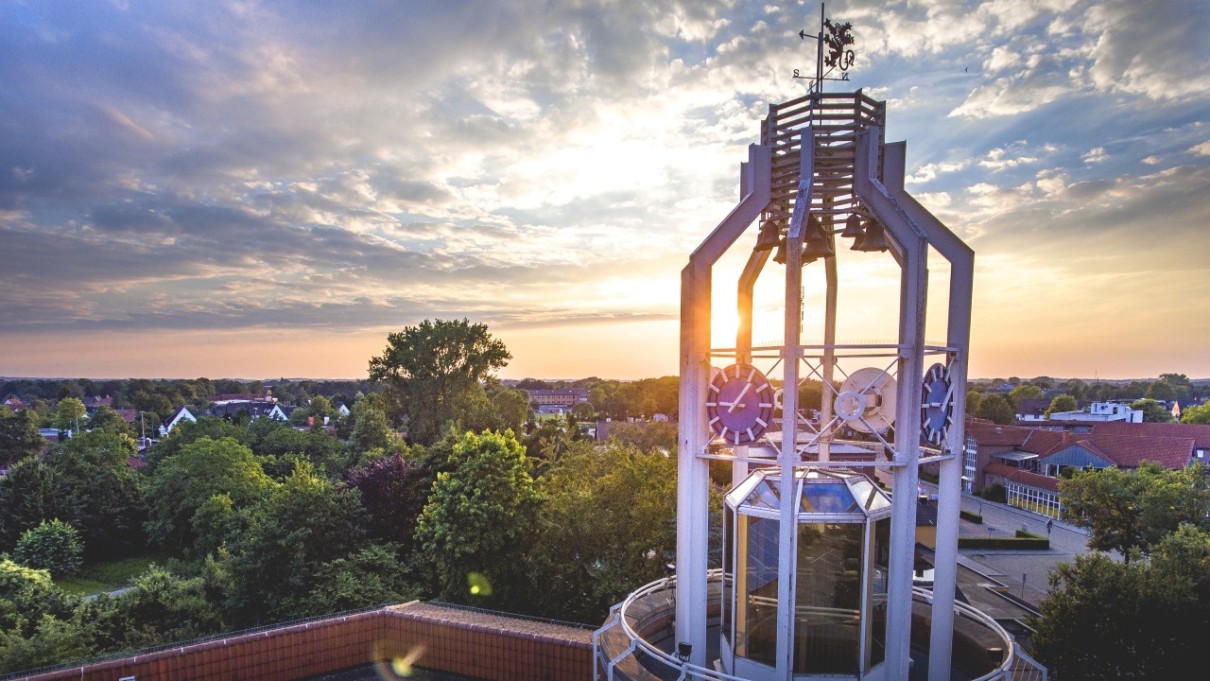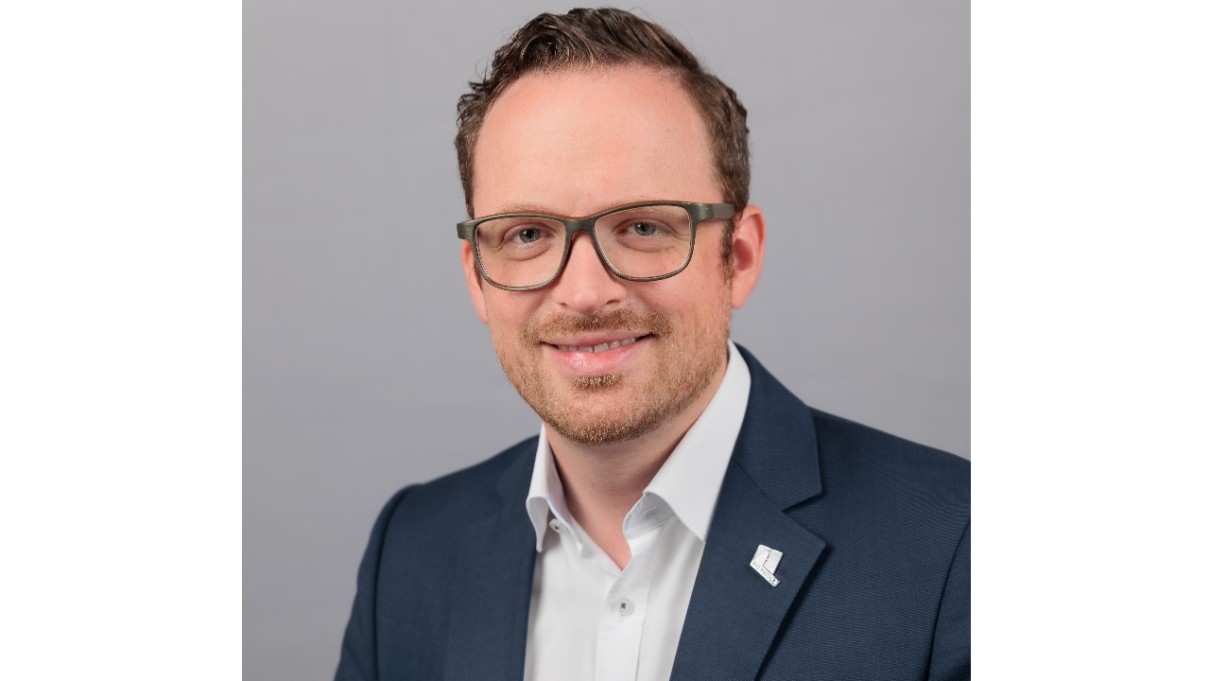Page content
Howto: Recruiting via social media

The town hall of Diepholz at sunset. The city has been using social media recruiting since the beginning of the year. Photo: Stadt Diepholz
The city of Diepholz has been relying on social media recruiting for several months. How did this come about?
Florian Marré: The question of how to recruit dedicated specialists and junior staff in the future is currently occupying many sectors in Germany - including the public sector. As the city of Diepholz, we have noticed over the past few years that traditional job advertisements in print have resulted in fewer and fewer applications. In times of an increasing shortage of skilled workers, we as employers must focus on the wishes and needs of applicants. We therefore asked ourselves two questions in particular: "Where do potential applicants look for vacancies?" and "How do potential applicants want to find out about and apply for jobs?" Anyone who asks themselves this question will quickly realize that the Internet is the key to modern applicant targeting. The online study by ARD and ZDF shows that the already high number of Internet users is continuing to rise. The amount of time spent online each day is also increasing. We wanted to take advantage of this development to recruit new colleagues.
How did you prepare the project and which channels do you rely on?
Florian Marré: Before we launched the project, we took a close look at the status quo of our approach to advertising jobs. Which channels do we rely on? How do we design the content? What costs do we incur and what response do we get to our ads? The city of Diepholz was already active on Facebook and Instagram before. However, advertising vacancies on these channels took up only a very small part of the overall advertising strategy. In consultation with the HR department, the staff council, and the top management, but also in consultation with the political bodies, it was decided to further expand the area of social media when advertising vacancies. We therefore set out to find an agency specializing in social media recruiting to accompany us along the way. Together, we adapted the agency's tried-and-tested processes to meet the specific requirements of public administrations when filling vacancies. This was a bold step, because in addition to addressing potential applicants, we also turned the application process itself inside out. To do justice to the typical usage behavior on social media, we streamlined the application process and now, as a first step, do without the familiar formalities such as a resume and cover letter. After all, if you're sitting on the train or picking up your cell phone on the sofa in the evening, you probably don't have these documents handy. Instead, the focus is on identifying suitable applicants with just a few clicks and contacting them at the lowest possible threshold. Documents from promising candidates are then requested. For our job ads, we rely on the two most widely used social media platforms in Germany: Facebook and Instagram. For the search for trainees for the start of training in 2024, we will also place an ad on TikTok for the first time, thus also venturing into previously uncharted territory for us.

Mayor Florian Marré Photo: Stadt Diepholz
What experiences have you had recruiting via social media in recent months?
Florian Marré: You could say that we are currently in a test phase. We have decided to continue placing job advertisements in the print sector and to start the new procedure in the social media sector in parallel to be able to compare the results of the two procedures. Both the number and quality of applications received via the social media ads and the feedback from applicants so far strongly suggest that we have taken the right approach with social media recruiting. However, we will not be able to draw a conclusion until the end of this year, when we will also be able to decide on our future strategy for job advertising.
What advice do you have for municipalities that have not yet ventured into social media communication?
Florian Marré: Most local governments in Germany are further along in the field of digitization than their reputation would suggest. Almost all of them have trainees and young colleagues who have grown up with social media and are happy to actively contribute to their employer in this area. This internal potential should be exploited. If you visit the social media sites of other administrations, you can see how differently the content and focus of the channels are designed. There you can also find suggestions and inspiration as to what content you would like to publish yourself and for what purpose. For specific questions, there are also more and more experts and agencies that have experience with the special needs and requirements of public clients for social media applications.
You write on the city's website that you want to set the course for the future in Diepholz. Is digitization a top priority for you?
Florian Marré: As in many areas, digitization can only work if everyone gets on board. As mayor, I am of course fully committed to this and set a good example. The heads of the various departments are also pulling in the same direction and are always proposing department-specific projects to advance digitization. At the same time, however, it is important to me to keep an open ear for concerns and worries that some colleagues may still have about digitization. It is important to me that no one is left behind when it comes to this topic. That's why we regularly offer an internal training program for employees. And the various experiences and knowledge of citizens around digitization must also be considered. As an administration, we must and want to make our offerings accessible to all citizens. This is increasingly working, but not yet exclusively by digital means, so we will continue to maintain our analog offerings.
How digital is the city of Diepholz already?
Florian Marré: The city of Diepholz embarked on a comprehensive digitization process many years ago. One of the biggest steps was the complete switch from paper to digital record keeping, which took place in 2017. The same applies to the work of the municipal committees. Since 2016, committee work by Diepholz municipal politicians, and the responsible employees has been completely paperless. In addition, for example, the digital recording of services at the building yard, e-payment or the digital invoice workflow have been introduced in recent years. All in all, the city of Diepholz is well on the way to digitization, but it is far from the end of the road.
Thank you very much for the interview.
The search for young talent and skilled workers is also the focus of this year's Career Day on November 9 at the Smart Country Convention. Fancy a 1:1 conversation with a company? Then register directly for Career Speed Dating. Participation is free of charge, but registration is required. For more information about Career Day, click here.
Become an exhibitor at #SCCON25
As a driving force for the future of digital administration and for equal digital living and working conditions in cities and rural areas, the Smart Country Convention is a must for all stakeholders who actively advance the digital transformation. Are you interested in advancing the digitization of our cities and municipalities too? Join us and position your company or municipality as an expert in digitalization in the public sector.



